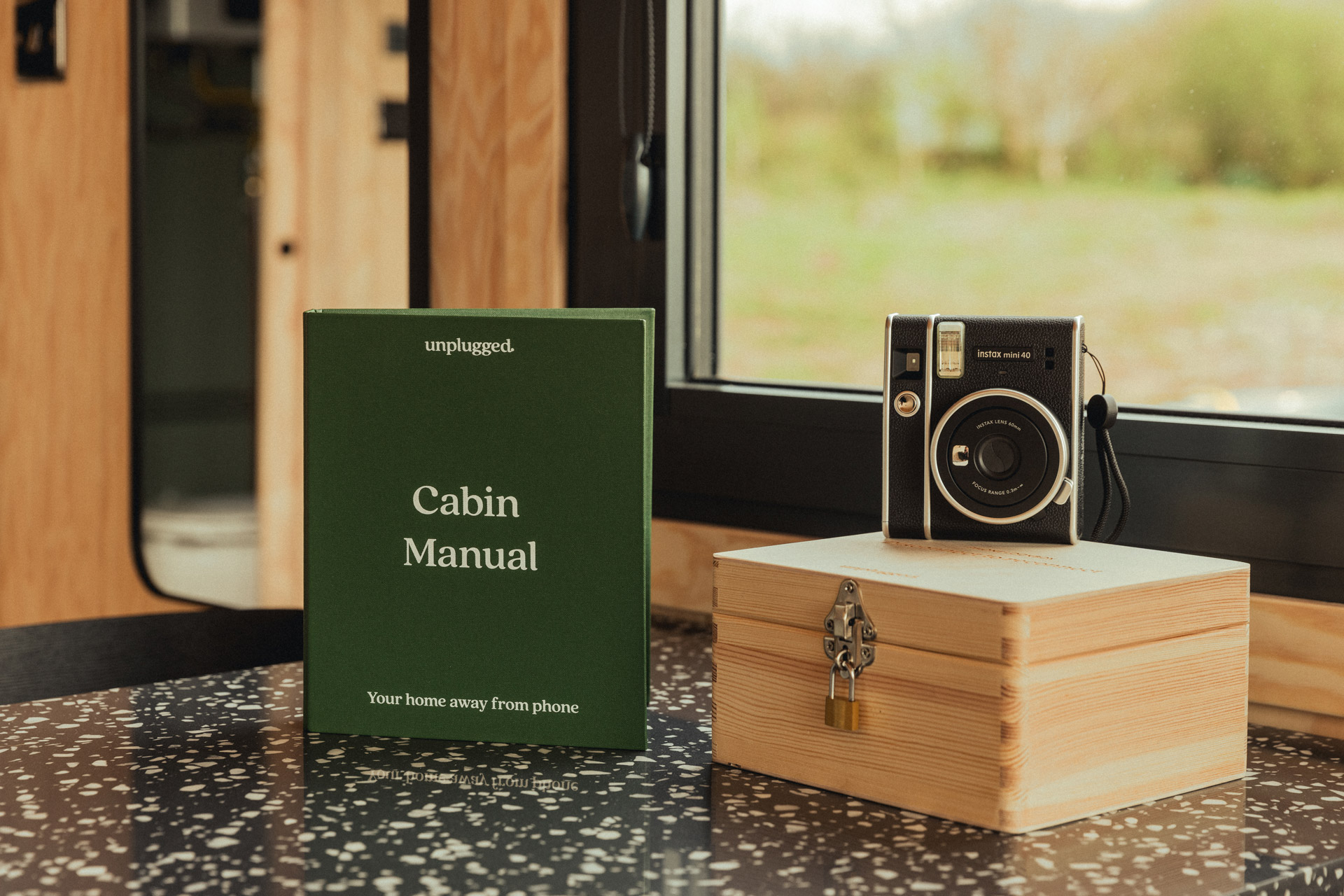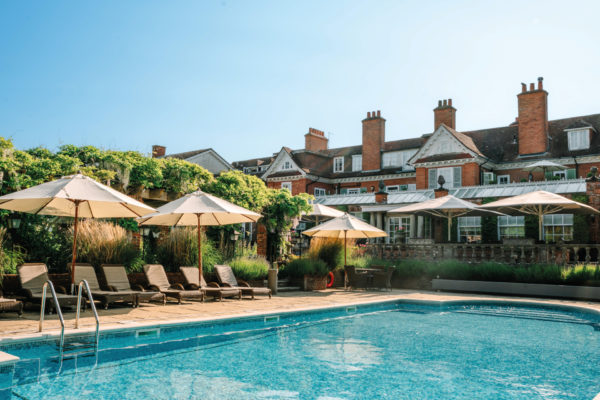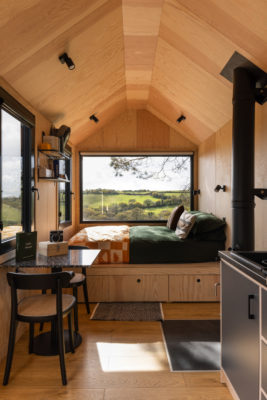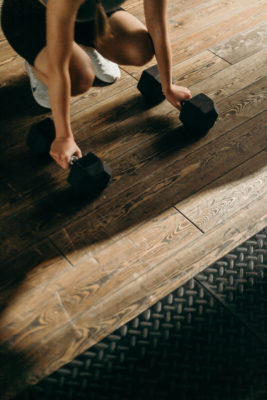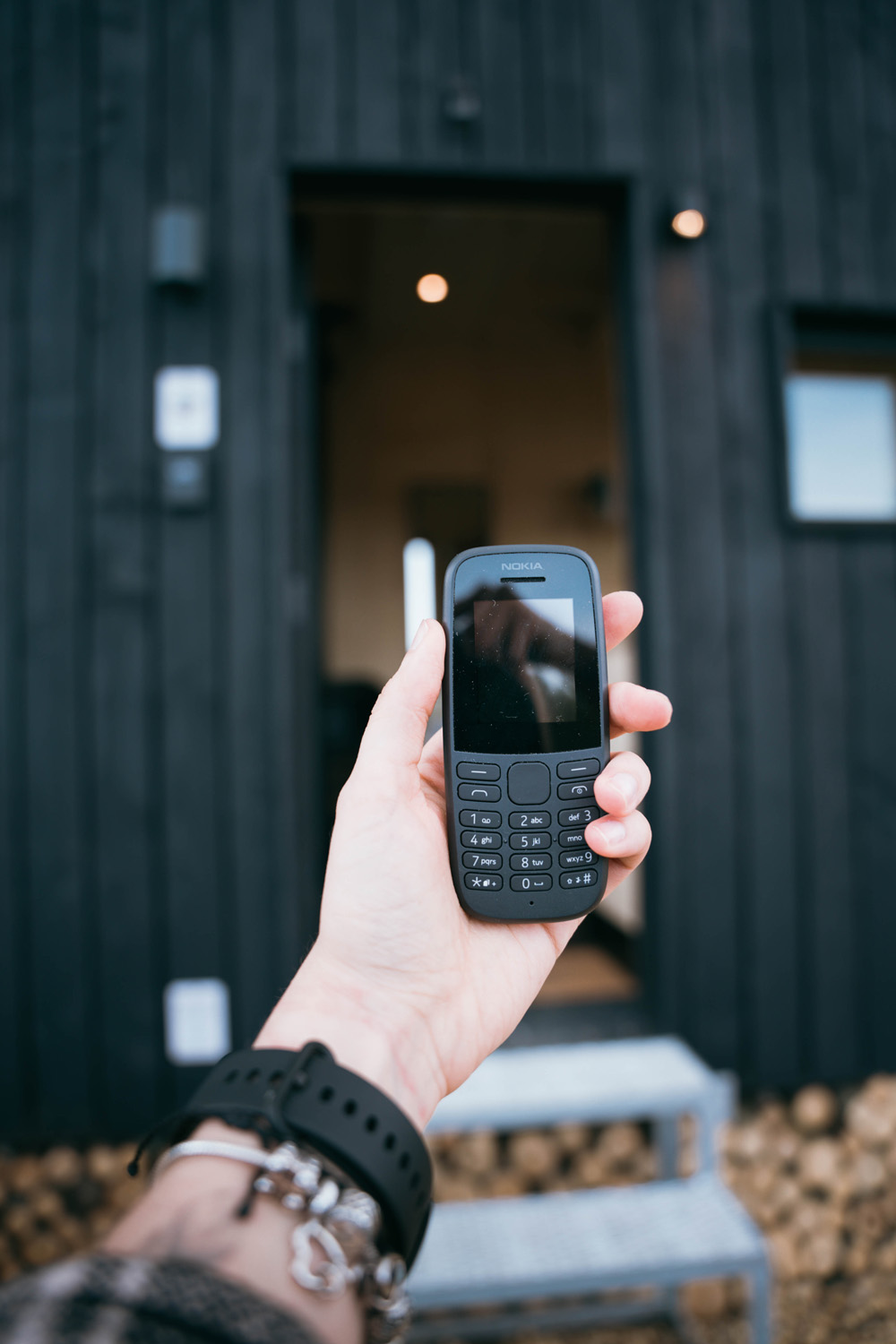
What Is Digital Detoxing? (& Who Actually Needs One?)
By
6 months ago
Here's a full run down on this wellness trend, courtesy of the experts
If your daily average screentime often soars over three, four, even five hours, you are far from alone: as one of Europe’s worst offenders, the average UK adult spends more than five hours everyday with their eyes locked to their phone screen – and that’s not including work-related screentime.
According to U Switch, in 2020 that figure was three hours everyday – meaning screentime has skyrocketed since the pandemic locked us inside with only our phone screens for company. And while Covid-19 raged outside in the real world, our obsession with the digital world allowed a plethora of more subtle maladies to infiltrate our minds: lower attention spans, worse sleep, reduced creativity, dire concentration. Digital addiction flourished – and even with screentime-controlling apps and TikTok boycotters blooming, we’ve still never quite managed to cut off the snake’s head.
For younger people, the picture is even worse: Specsavers reports children aged five to 16 spend at least six hours a day looking at screens, whether that’s gaming, watching TV or playing with (or scrolling on) smartphones and tablets. The internet is fully ingrained into the lives of our youth – according to Ofcom, 96 percent of children aged five to seven use the internet, rising to more than 99 percent of children aged 12 to 15 – but the full impact this will have on young brains and their development is yet to be seen.
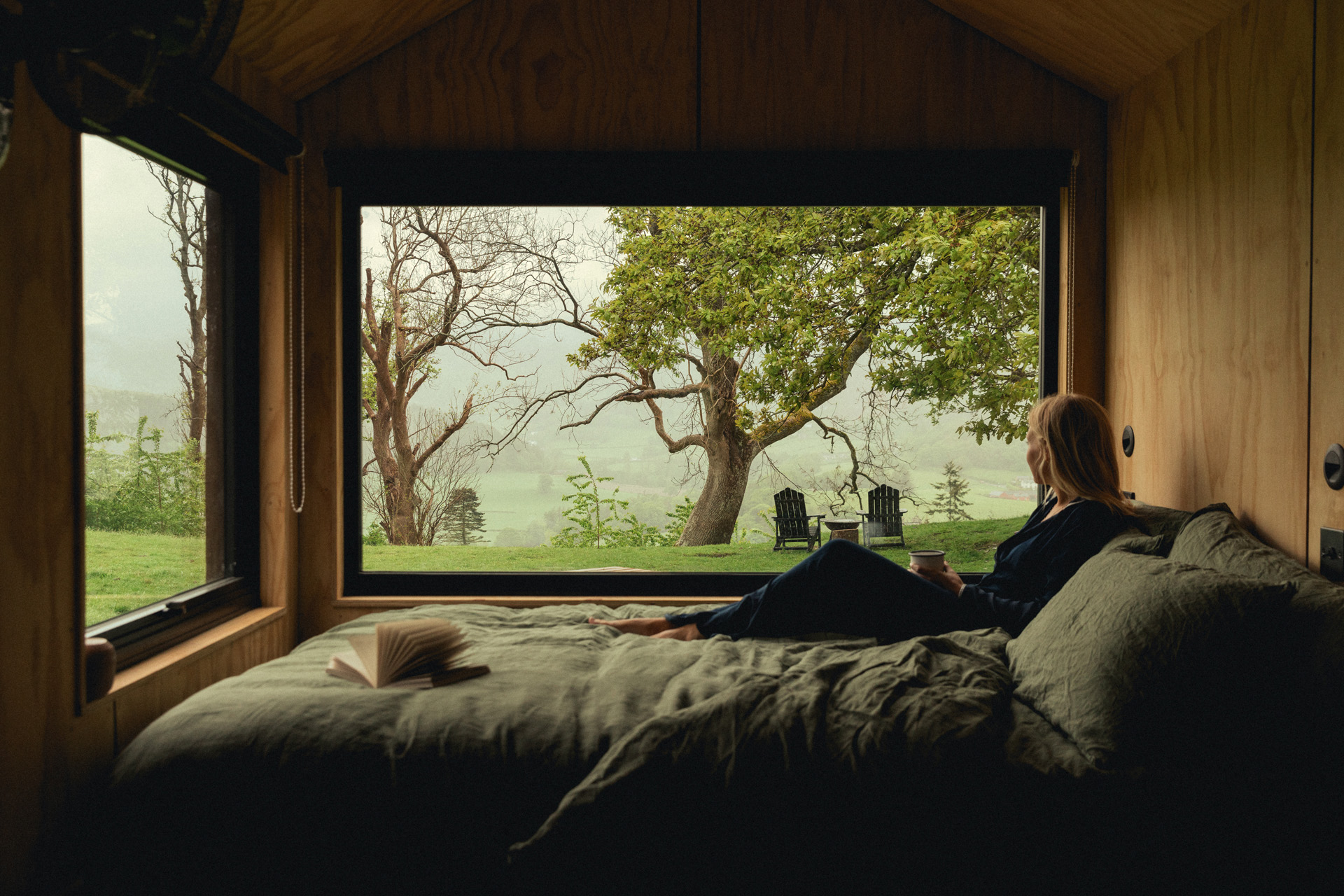
Unplugged cabin Griffin in North Wales. (© Rebecca Hope)
Launching at the end of 2019, retreat startup Unplugged was founded to tackle burnout plaguing city professionals up and down the country – but digital detoxing has become the brand’s bread and butter. Offering city-accessible nature-immersed off-grid cabins fuelled by solar energy, the brand boasts just over 30 cabins scattered across the UK, with that number set to double by the year’s end, answering an exponential demand from nature-starved office workers.
‘There has been a cultural shift toward prioritising wellbeing in the last few years,’ says digital wellness expert and Unplugged co-founder Hector Hughes. ‘Nearly 75 percent of the UK population now consider wellbeing as a top priority which has influenced their travel choices. People are starting to realise the negative effects that high screen time can have on our mental wellbeing – such as increased stress, poor sleep and constant distraction from the present moment – and are seeking an escape from being chronically online.’
We picked Hughes’s brains to find out more about digital detoxing – and who might benefit most.
Who Needs A Digital Detox?
Before we get into the benefits of a digital detox, it’s worth considering who might need one. The short answer? Most of us.
‘A lot of us have been so chronically online for the last 10 years that you might not actually remember how it feels to be offline,’ Hughes tells us. The symptoms of digital overload – the point at which you need a digital detox – can vary. For the most digitally addicted, common indicators include ‘feeling lost or anxious when you’re away from your phone (nomophobia), or feeling uncomfortable in moments of stillness or boredom,’ Hughes says. ‘High screen time, especially scrolling social media can cause lack of motivation, short attention span and low productivity. You might also get easily distracted and find it hard to complete tasks without picking up your phone for a scroll break. This is due to the small dopamine spikes social media gives you which means you’re not as motivated to complete larger tasks which is harder-to-earn dopamine.’
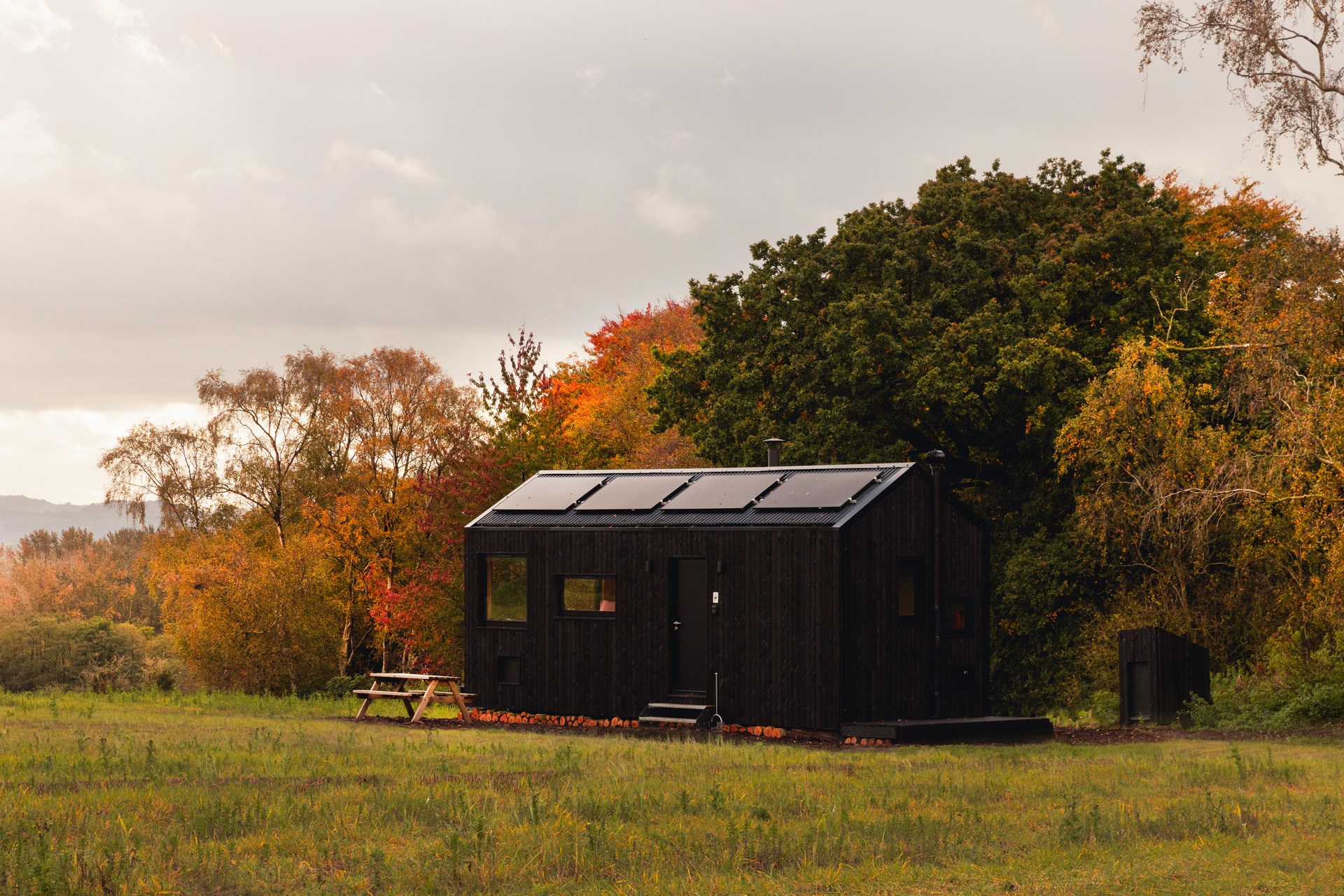
Unplugged cabin Luna, near Manchester (© Rebecca Hope)
Even if you don’t feel addicted to your smartphone, the average UK adult likely shows some signs of digital addiction. ‘Poor sleep and general fatigue can also arise from digital overload,’ Hughes says. ‘Using phones before sleep makes it harder for you to get to sleep as your brain is still active.’
If the idea of not having a mobile phone to hand at all times fills you with dread – what if someone needs to contact me? – this is another sign of digital addiction. ‘You might suffer from FOSO (fear of switching off) as you’re so used to being reachable all the time that the thought of being offline fills you with anxiety,’ Hughes says. The Unplugged team are so conscious of FOSO, each cabin comes equipped with its own Nokia (yes, complete with Snake) so you can be reached in case of emergency – and vice versa.
On the flipside, of course, not everyone is actually addicted to their phone. In fact, ‘if you see your phone or laptop as a tool rather than a hobby,’ you’re already on the right lines, Hughes says. ‘Using technology has so many benefits to make human life easier, but if you use it for mindless things like scrolling, it can become unhealthy. Try and aim for your screen time to be under one hour for social activity.’
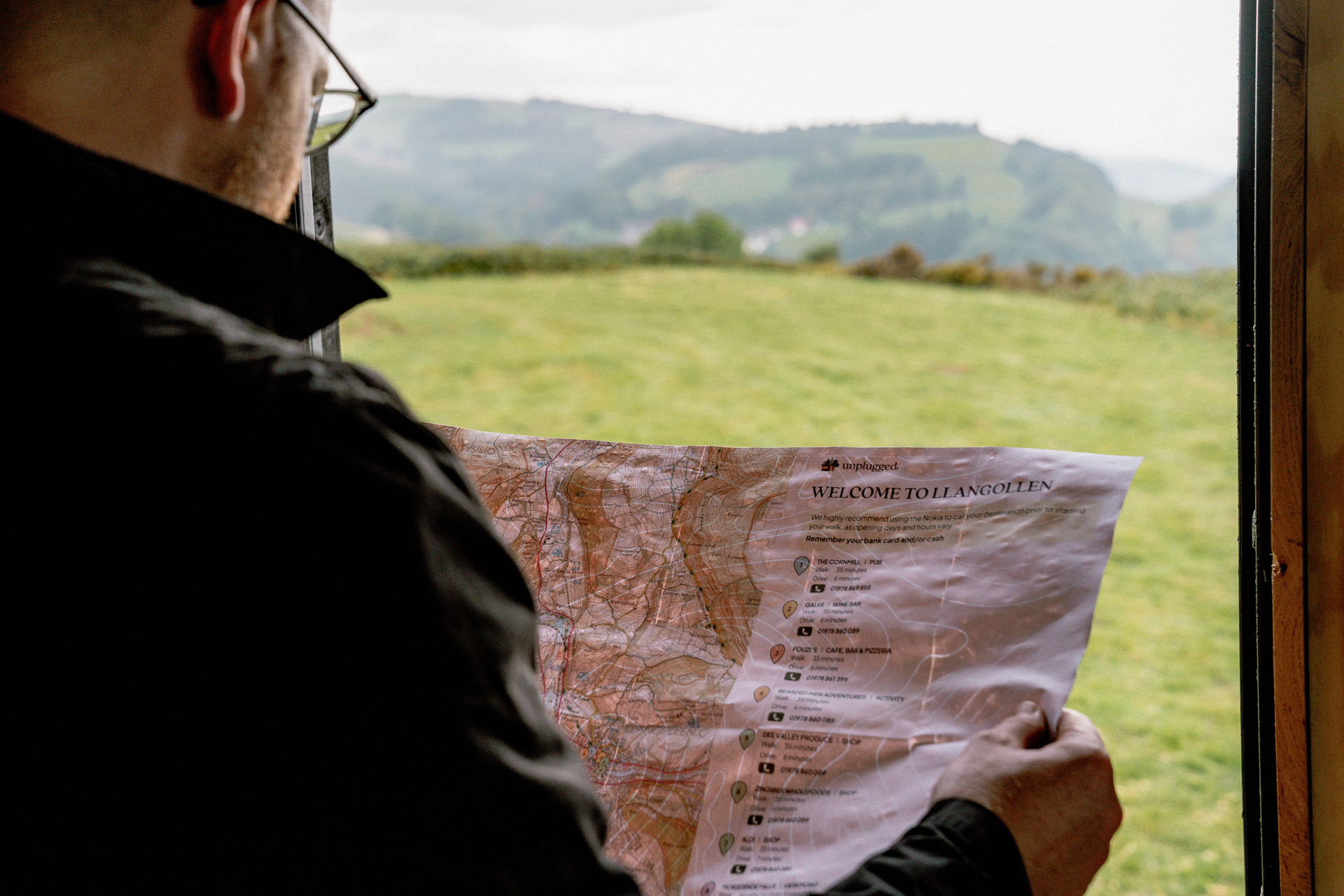
Maps are provided to help Unplugged guests navigate the area around their cabin. (© Adam Firman)
The Problem With Digital Addiction
If you recognise yourself in the above traits but don’t sense there’s a problem, wait until you have tried a digital detox or visited an Unplugged cabin to cast judgement. ‘When you actually take a digital detox, you will find the symptoms of being digitally overloaded so much easier to recognise,’ Hughes says. And while it may not feel on the surface that needing your phone right by your side at all times is deteriorating your life – is this not simply a symptom of the modern age? – digital addiction can have very real consequences on our lives and interpersonal relationships.
‘You might be lacking deeper real-life connections if you spend a lot of time on social media,’ Hughes points out. Ever felt like you have learned enough about someone’s life via Instagram stories to need a proper in-person catch-up? ‘When we consume content on our feeds, this gives a false sense of connection,’ Hughes says. ‘Humans are social beings and we need meaningful connections to thrive, which can be harder to build when we’re always on our phones. Having strong social support has a huge impact on our mental and physical health, even impacting our sleep quality.
‘Stress is a big indicator, too,’ Hughes adds. ‘We only used to be able to work during opening hours, but now we can work anywhere, any time. Being always-on, comparing yourself to others on social media, reading negative news all contribute to increased levels of stress. And stress is not good for our brains, health or even skin.’
Breaking The Scroll
‘If you spend hours on your phone scrolling social media and don’t feel present in the moment, you might want to consider making some habit changes,’ Hughes says. ‘It’s not anyone’s fault if they feel addicted to their phone – 62 percent of UK adults say they hate how much time they spend on their phone, but they still do it. Phones are expertly built to be addictive: social media makes money by capturing your attention. But you can take control and utilise built-in tools and tactics to break the scroll.’
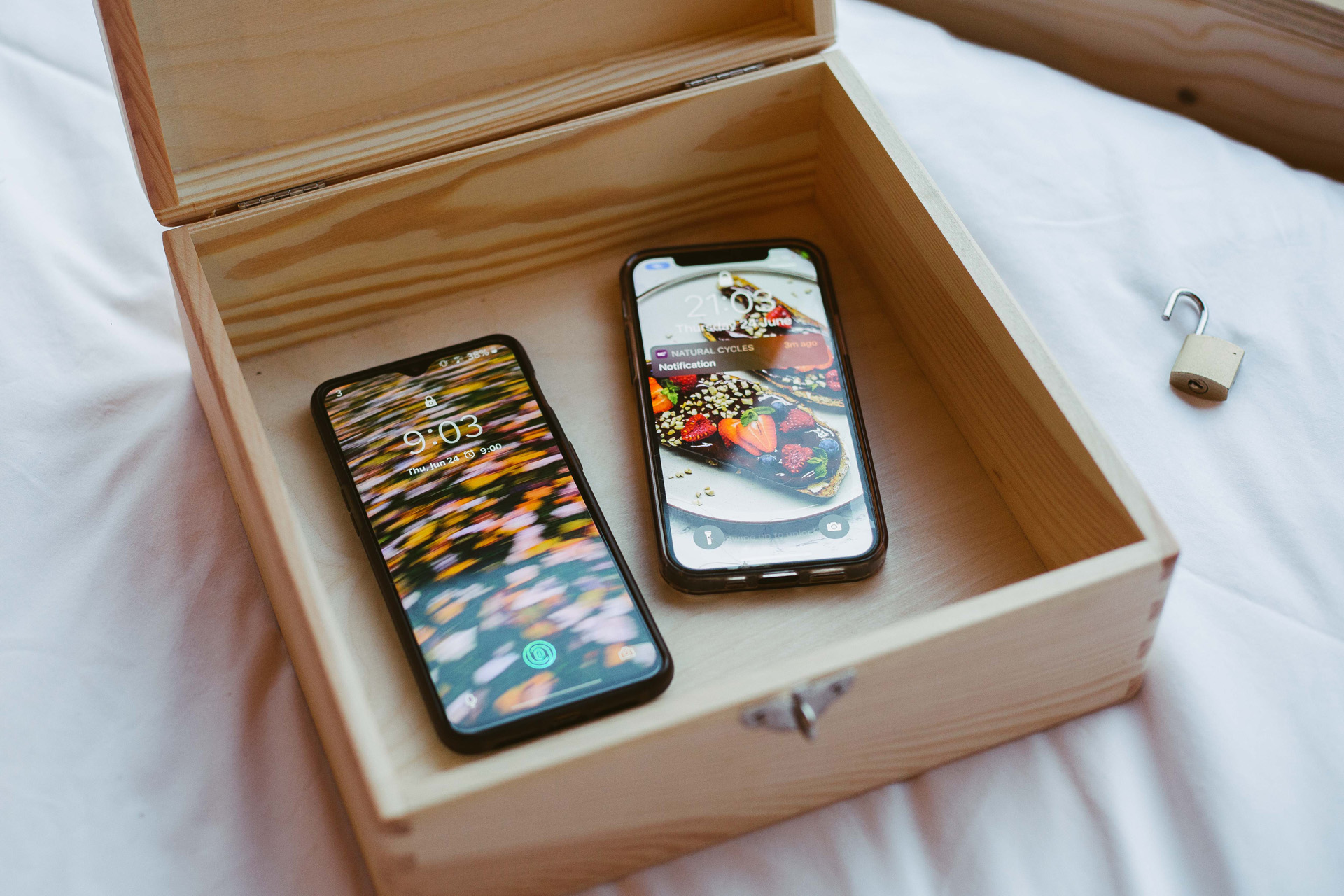
(© pasco.photography)
Most smartphones are now equipped with screentime monitoring software, with additional apps available to block overuse of social media to prevent doomscrolling. You could start by ‘scheduling a specific time period in the day that you’ll be offline,’ Hughes suggests. ‘This makes it easier to disconnect as you know the duration you’ll be unreachable.’
You could fill this daily timeslot with a daily walk in nature; ‘I especially like an offline stroll in the morning, so you start the day right and wake yourself up with natural light,’ Hughes says. ‘Remember that you’re not just “in” nature, you “are” nature – don’t disconnect yourself from the natural world that you are a part of.’
During this time, stave the anxiety by ‘letting other people know you won’t have your phone,’ Hughes recommends – and ‘remembering a bank card if you usually use your phone to pay’ if you fancy treating yourself to a coffee or pastry. ‘These little actions of intent help you stay disconnected.’
‘The more you do something, the easier it becomes,’ Hughes says – and this is true of a daily walk in nature or even just resisting the ‘ignore’ button on your screentime notification. But the self-guided nature of this kind of digital detoxing can reduce its efficacy: most scroll-blocking apps can be skirted around with a passcode or simply by tapping ‘ignore’ – so if you are lacking self-discipline, tougher measures might be needed…
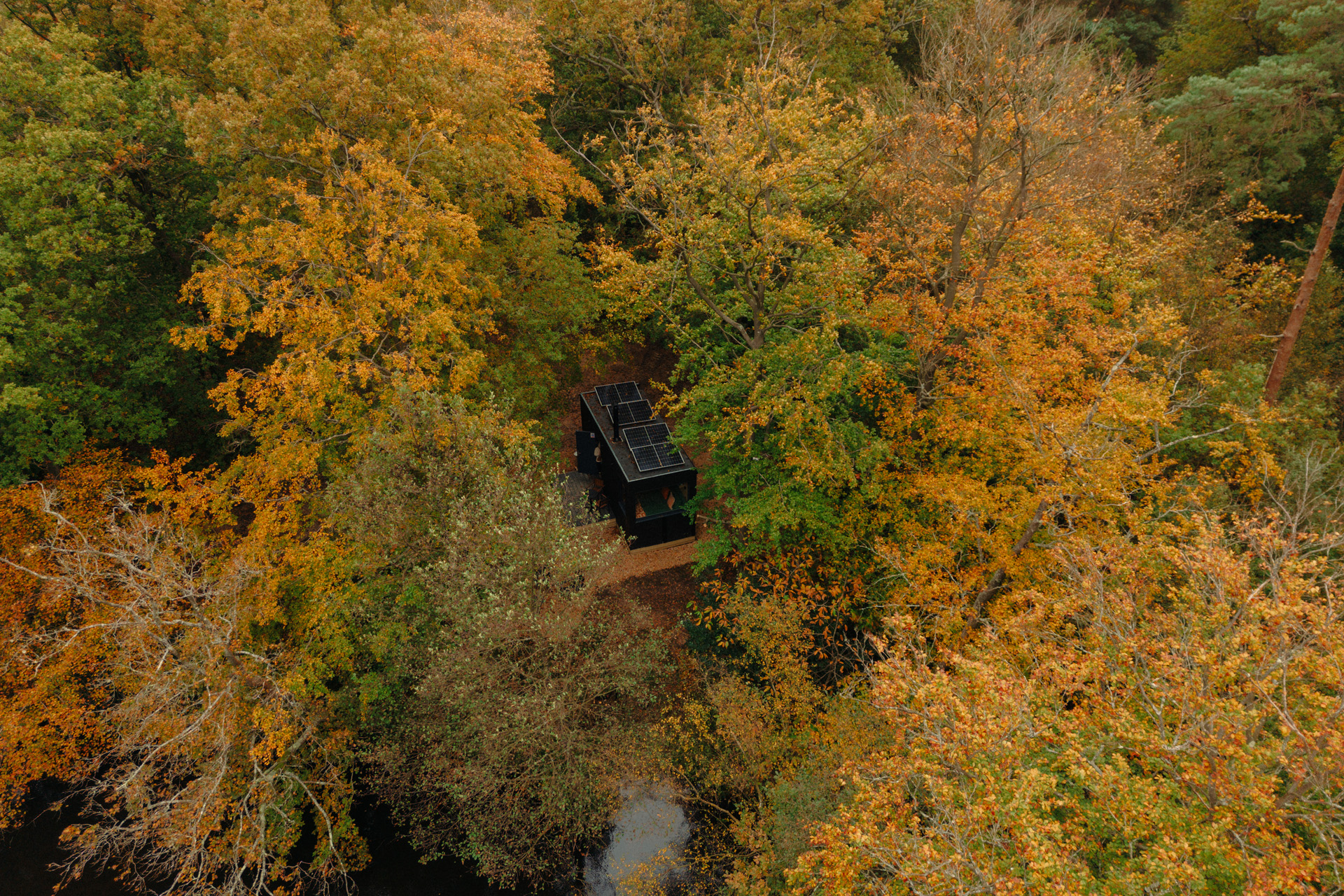
Unplugged cabin Willow
The Digital Detox Retreat
One option for digital addicts is going cold turkey and embarking on a detox. ‘A digital detox is a period of time when you refrain from using devices and technology such as smartphones, laptops and TV,’ Hughes explains. ‘It’s a voluntary withdrawal from screen time to act as a kickstart to building a better relationship with tech.’
Being ‘away from your normal environment’ is especially effective for digital detoxing ‘as you’re intentionally spending time offline for a specific duration,’ Hughes says. His company Unplugged is a great option for this, especially for city professionals. The brand boasts more than 30 off-grid cabins scattered across the UK, all located within easy reach of our major cities, including London, Birmingham and Manchester.
Though they were originally masterminded to tackle burnout (and still do), ‘our cabins are built for digital detoxing,’ Hughes says. Guests start by locking away their smartphones in a wooden box, and saying goodbye to notifications of all kinds: no email whooshes, no WhatsApp pings, no Instagram mentions. But it’s not goodbye to media in all of its forms: ‘We include everything you might need to be offline: an instant camera, physical map, cassette radio and even a replacement Nokia for emergencies or talking to loved ones,’ Hughes says. ‘Our cabins are also surrounded by nature, which emphasise the benefits of being offline – you’ll feel less stressed, more creative and more present.’
Unplugged’s science-backed offering is tailored to tackle digital addiction. ‘Our digital detoxes are at least 72 hours, which is the sweet spot for truly switching off,’ Hughes explains. ‘Spending three days offline and in nature can dramatically reduce stress levels, boost cognitive function and even begin to break phone addiction.
‘Our cabins are also great for longer periods of deep focus or spending quality time with loved ones,’ Hughes adds. ‘As well as feeling like you’ve reset your brain to factory settings, they give you the opportunity to change your perspective on how much time you’re spending on your phones and how much free time you have when they’re removed from reach.
‘Without constant distraction or a lens into the wider world, you’re more present in the moment,’ Hughes says. ‘It gives you time to reflect, feel and build deeper relationships with others or yourself. You find that you have more creativity and time and patience for slower activities like reading or walks.’
Taking this even further, Unplugged recently teamed up with Cornwall wellbeing centre Cabilla, renowned for its nature immersion retreats centred on forest bathing in its ancient temperate rainforest and oak woodlands, which Hughes calls ‘the ultimate form of nature for healing’. ‘Cabilla is home to a rare temperate rainforest that currently only makes up less than 2 percent of the UK’s woodland, so the restorative powers of this ecosystem are mega,’ he says.
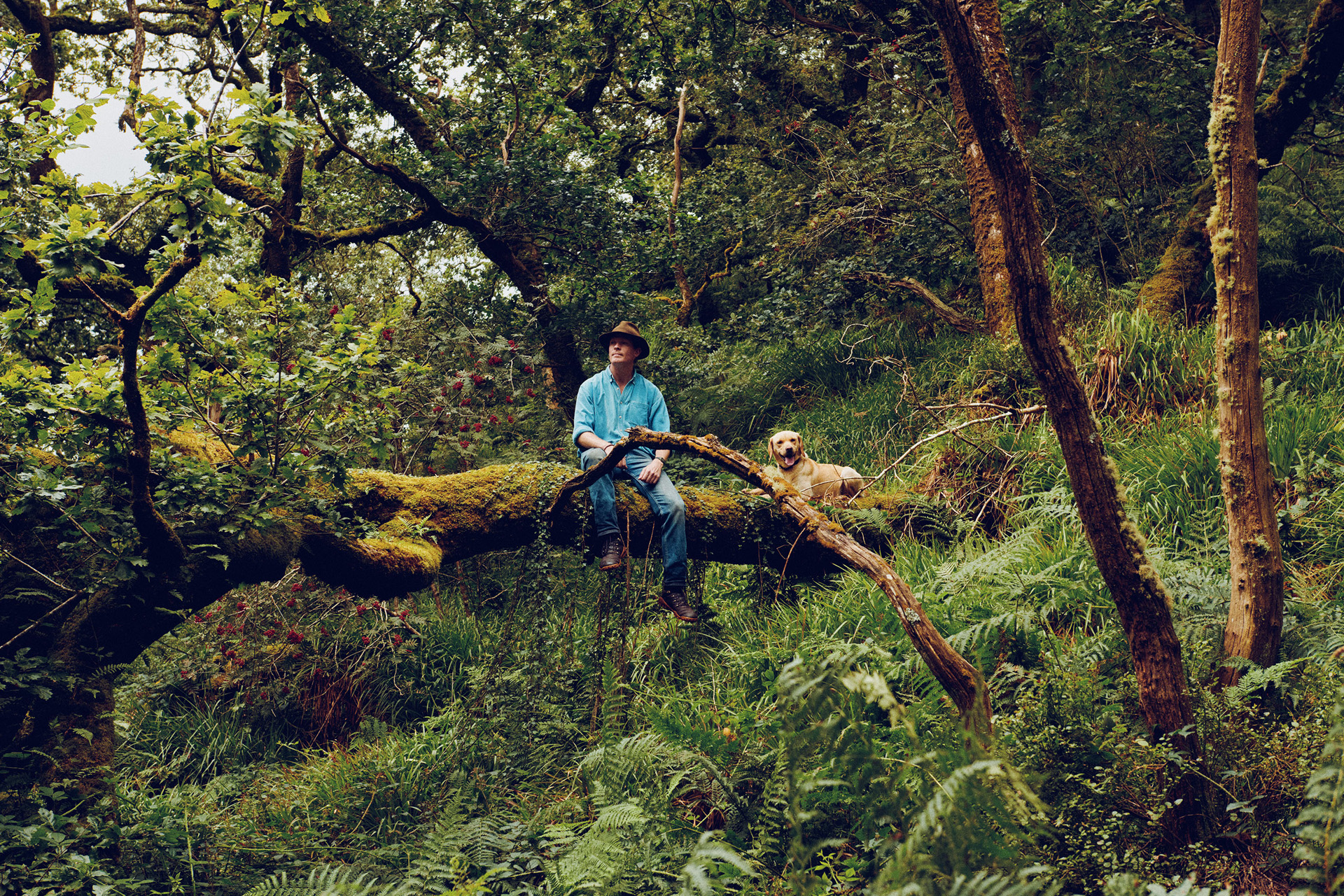
Merlin Hanbury-Tenison, co-founder of Cabilla. (© Bex Aston)
With the inaugural retreat taking place in July, new dates were added swiftly thanks to huge demand. Cabilla co-founder Lizzie Hanbury-Tenison describes the collaborative retreat as ‘a re-set away from tech’, where guests can ‘connect with other like minded people who are seeking the same thing’.
‘We find that when people make new, in person connections (vs online ones) it can be really profound and meaningful,’ Hanbury-Tenison says.
As for what it entails, ‘as with all of the retreats we host, the experience has a framework to it, however, it isn’t rigid,’ Hanbury-Tenison says. ‘This unplugging on your terms. We’ve designed it so you get the best of everything we have to offer here at Cabilla. A guided tour of our ancient rainforest, which is full of phytoncides and terpenes to give you a sense of calm and clarity. A wild dip and sauna session by the river, seasonal food cooked by our incredible private chefs, an evening soundbath (just turn up in your pjs and then go straight to bed!), and gentle movement classes by Sienna, our MD and retreat lead.’
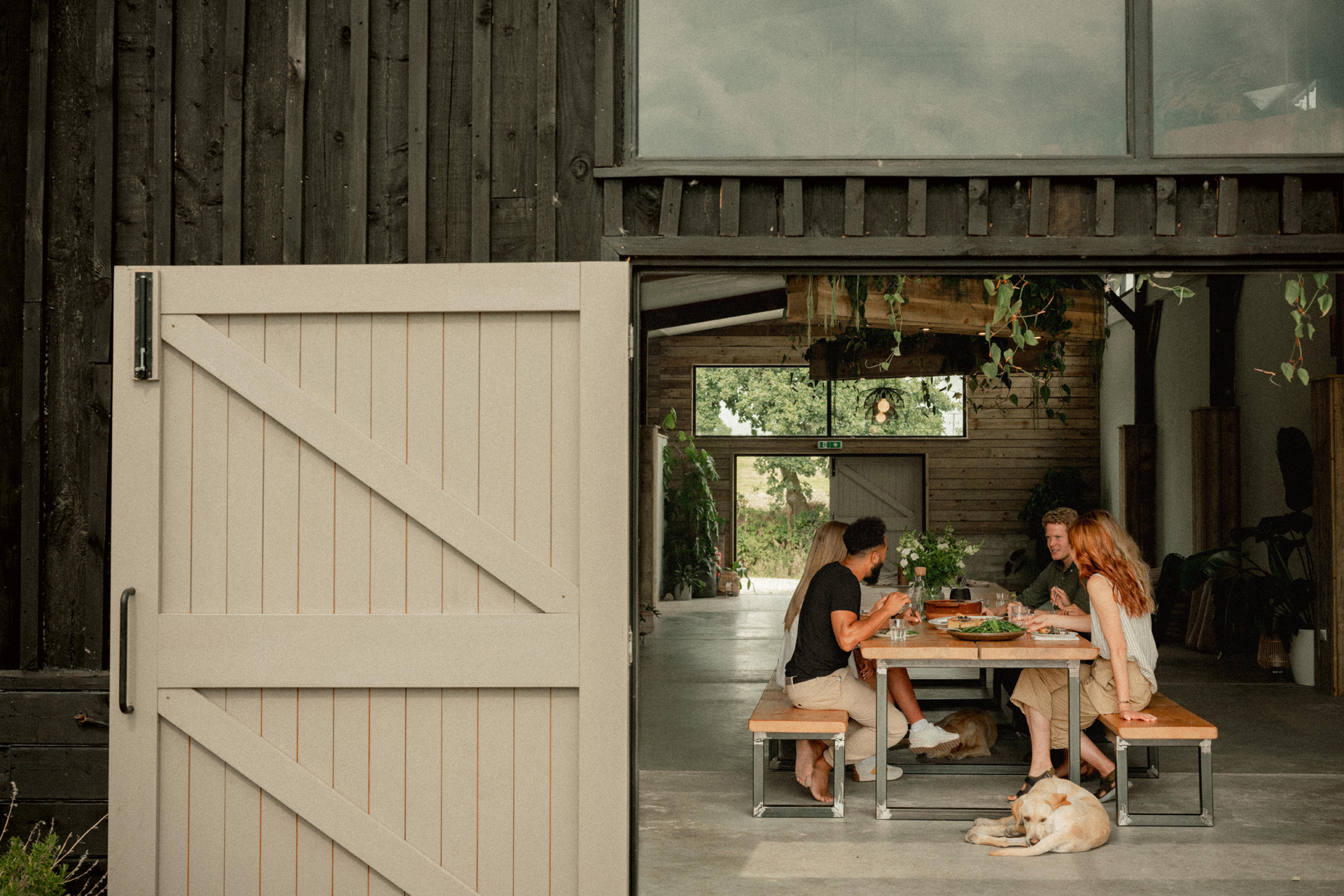
Dinner time at Cabilla. (© Jenna Foxton)
‘This retreat offers people a way to access nature, disconnect from technology and build real-life connections – all the things a lot of people feel like they’re lacking in modern day,’ Hughes says. ‘We have seen a big shift in the number of people visiting our cabins over the last few years, consistently being 80 to 100 percent occupied all year round.’
As for Cabilla, which offers retreats year-round at its Cornwall home, ‘we’re already taking bookings for 2027,’ Hanbury-Tenison says. ‘So it feels – hopefully – like this is a shift that is here to stay.’
BOOK IT
Unplugged’s three three-day Digital Detox stays start from £390 per cabin.
The next Cabilla Unplugged retreat will take place from 25 to 28 September 2025 in Cornwall. Prices start from £625pp based on two sharing one room.





